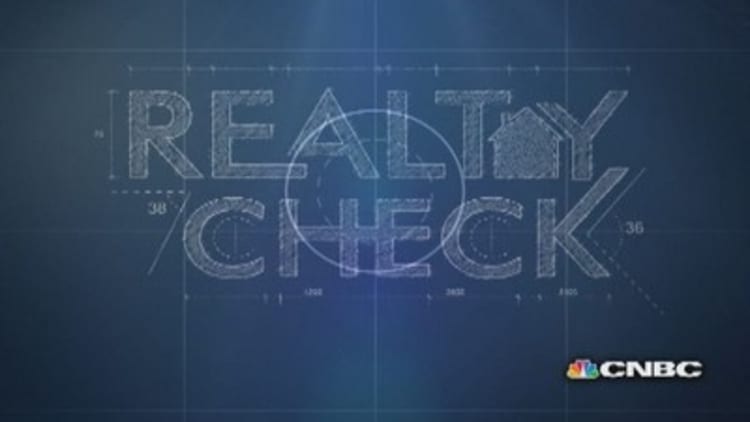
Today's housing market belches new numbers almost hourly, and some seem counter-intuitive; that is precisely because the current housing market is driven by abnormal circumstances. Sales and prices are driven by investors, and credit is being manipulated by the Federal Reserve.
Take, for example, Tuesday's quarterly home price report from the National Association of Realtors. It shows home prices up 10.1 percent year-over-year in the last quarter of 2013. That's a big gain, but not as large as the 12.5 percent annual gain in the third quarter of 2013.
"The vast majority of homeowners have seen significant gains in equity over the past two years, which is helping the economy through increased consumer spending," said NAR chief economist Lawrence Yun in a release. "At the same time, home prices have been rising faster than incomes, while mortgage interest rates are above the record lows of a year ago. This is beginning to hamper housing affordability."
Home price gains are coming down, but affordability is weakening. Shouldn't affordability be strengthening if prices are easing? No, because all-cash investors, not regular owner-occupant buyers in need of financing, are fueling the price gains. Home prices shot up so fast due to these investors, that many buyers, especially first-time buyers, were shut out of the housing market. At least, that's one contention.
"I don't really think it was driven by investors," said Richard Smith, CEO of Realogy in an interview. "Institutional investors represented a very small percentage of the market. They get a lot of the headline exposure, but they're not really having that big of an impact."
Instead, Smith argued, it is part higher interest rates, part flat income levels and a big part fast-rising prices. Those prices, he says are due to lack of inventory.

"Pricing is still reacting to demand outstripping supply, and until we see an increase in inventory, you're going to continue to see price increases that will be higher than what has been anticipated," added Smith.
Bad weather has had a big impact on new supply so far in 2014. That could mean that pent-up sellers will explode onto the market once temperatures begin to rise this spring. That is the big hope, but by no means a guarantee. The mortgage market has been a big wet blanket adding to all the recent snow and ice.
(Read more: Foreclosures could rise if Congress doesn't help)
But a thaw in credit could be coming. The latest monthly report from the Mortgage Bankers Association on credit availability found it had increased in January, at least a little.
"Overall, mortgage lenders and investors slightly expanded credit offerings in January on net, but this represented the combination of two divergent trends," said Mike Fratatoni, chief economist at MBA. "First, the market continues to adapt to the new QM [Qualified Mortgage] regulation by eliminating products that do not fit inside of the QM box. This tightening is being offset, both in the market for higher balance loans, where lenders continue to loosen terms for jumbo loans, and in the refi market, where more lenders are offering streamline refinance programs."
Buyer and seller perceptions of credit availability are also improving, according to a new report from mortgage giant Fannie Mae. A majority of consumers now believe that it is getting easier to get a mortgage, the first time in the Fannie Mae survey's three-and-a-half-year history.
(Read more: All-cash offers crushing first-time homebuyers)
"The gradual upward trend in this indicator during the last few months bodes well for the housing recovery and may be contributing to this month's increase in consumers' intention to buy rather than rent their next home," noted Doug Duncan, Fannie Mae's chief economist in a release.
Consumers in the survey also, however, expected home price gains to ease. It all throws a big wild card in the air for the spring market, historically the most busy season for home buying and selling.
(Read more: Don't blame tech industry for tech hubs' high home prices)
—By CNBC's Diana Olick. Follow her on Twitter @Diana_Olick.
Questions?Comments? facebook.com/DianaOlickCNBC


